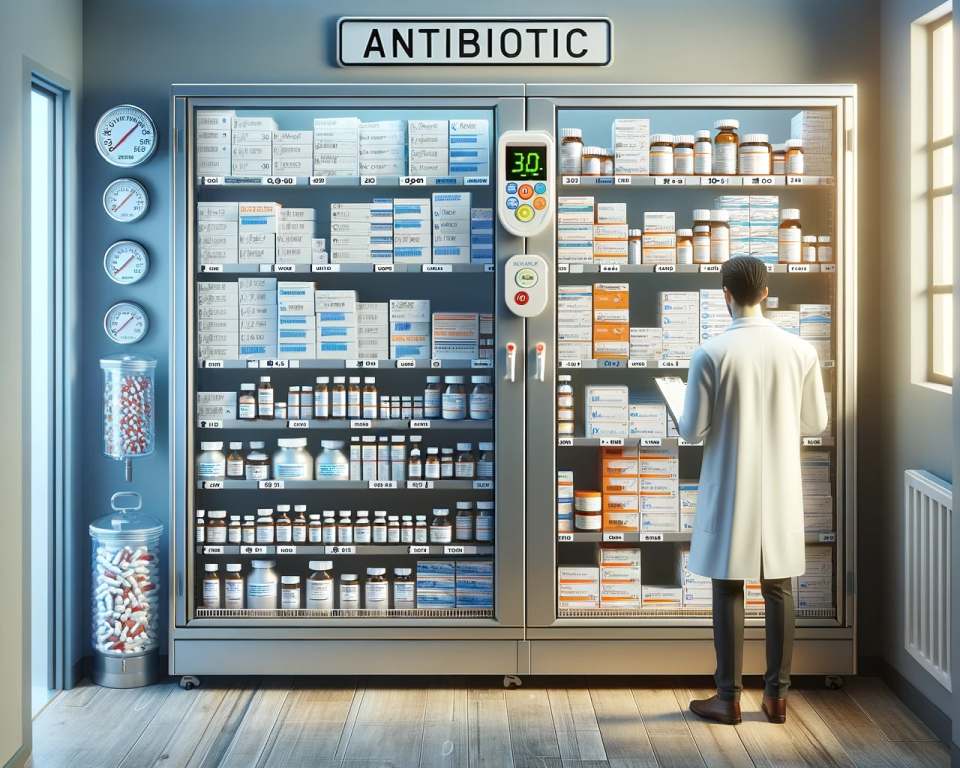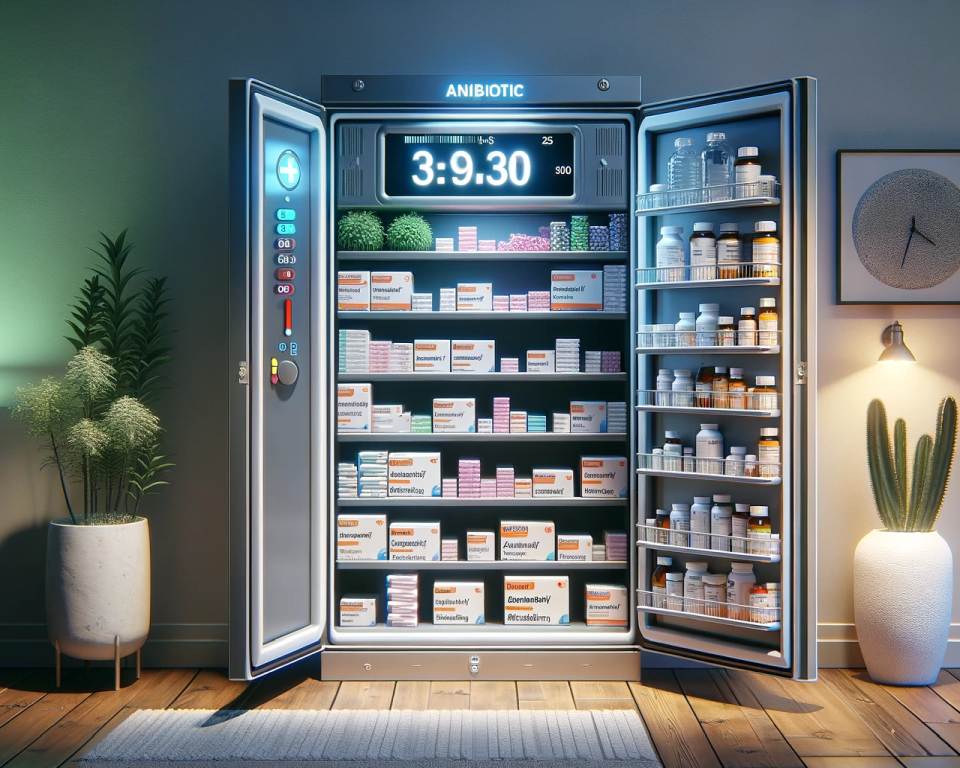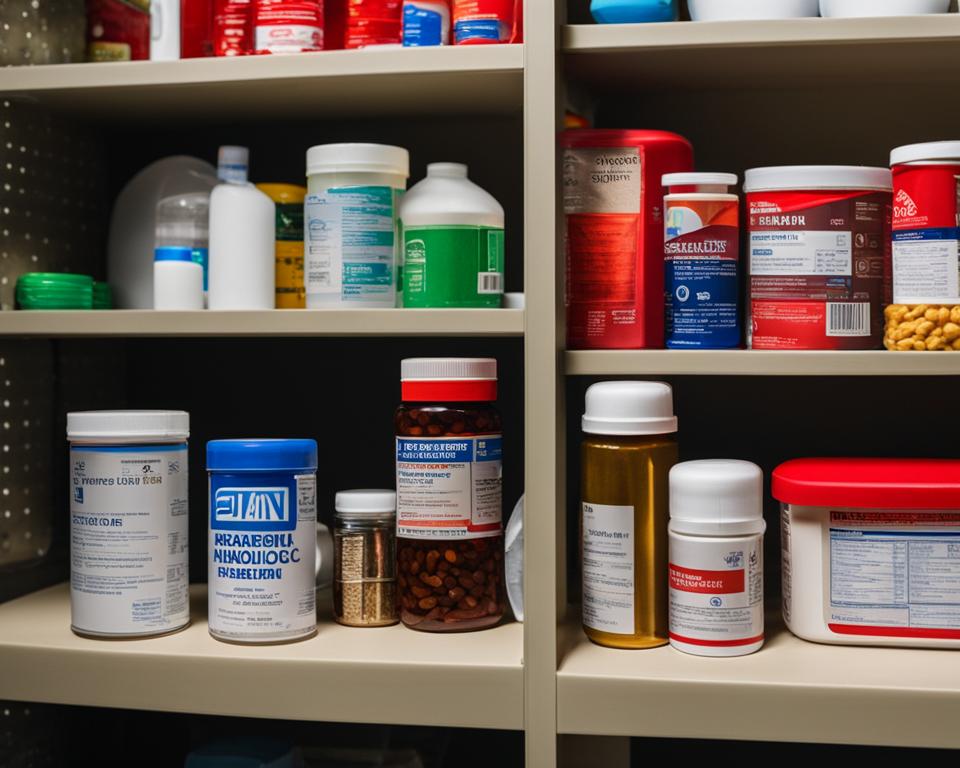Antibiotics in Prepping: How to Safely Acquire and Store Them
Preppers understand the crucial role of antibiotics in emergency preparedness. Having a stockpile of essential medications can be a matter of life and death in a crisis. In this guide, we will provide valuable information on acquiring and storing antibiotics for long-term use in emergency situations. Our advice comes from experts in the field and is based on thorough research.
Key Takeaways:
- Choosing the right antibiotics is essential for preppers
- Consult with healthcare professionals to determine your specific needs
- Acquire antibiotics legally and through safe channels
- Store antibiotics in proper conditions to maintain their effectiveness
- Expired antibiotics should be disposed of responsibly
Selecting the Best Antibiotics for Prepping
When it comes to preparing for emergencies, having the right antibiotics is crucial for your survival. In order to effectively protect yourself and your loved ones, it is essential to select the best antibiotics for prepping. Our experts have identified a list of must-have antibiotics for preppers that are highly effective against a wide range of bacterial infections and have a long shelf life.
Here are some recommended antibiotics for preppers:
“Amoxicillin: This versatile antibiotic is commonly prescribed for respiratory infections and urinary tract infections.”
“Ampicillin: Highly effective against bacterial meningitis, respiratory infections, and urinary tract infections.”
“Ciprofloxacin: An excellent choice for treating skin infections, gastrointestinal infections, and anthrax exposure.”
“Doxycycline: Effective against respiratory infections, sexually transmitted infections, and tick-borne illnesses.”
“Metronidazole: Essential for treating bacterial vaginosis, certain gastrointestinal infections, and dental infections.”

Determining the Best Antibiotics for Your Needs
While these antibiotics are highly recommended for preppers, it’s important to consult with a healthcare professional or medical expert to determine the best antibiotics for your specific needs and medical conditions. Our bodies may react differently to different medications, so it’s crucial to get personalized advice from a professional.
Remember, stockpiling antibiotics without proper guidance can be dangerous. Always seek professional advice to ensure you are acquiring the right antibiotics for your emergency preparedness kit. Take the necessary steps to protect yourself and your loved ones during times of crisis.
Acquiring Antibiotics for Prepping
Acquiring antibiotics for prepping can be a challenging task, as these medications are typically prescription-based and should be obtained through legal and safe means. To ensure the safety and effectiveness of your antibiotic stockpile, we recommend consulting with a healthcare professional to discuss your specific needs and obtain a valid prescription.
However, there are alternative options that some preppers explore, such as purchasing antibiotics from reputable online suppliers or participating in antibiotic sharing networks. It is crucial to exercise caution when acquiring antibiotics through these channels. Ensure the authenticity of the antibiotics, check for proper storage conditions, and confirm adherence to expiration dates.
Proper storage conditions play a vital role in preserving the potency of antibiotics for long-term use. In the next section, we will discuss in detail how to store antibiotics to maximize their shelf life.

In this image, we can see a visual representation of the storage of antibiotics. It provides a visual aid to understand the proper storage conditions necessary for maintaining the effectiveness of antibiotics.
Storing Antibiotics for Long-Term Use
Proper storage of antibiotics is crucial to maintain their effectiveness for long-term use. As survivalists, we understand the importance of having a reliable supply of antibiotics in case of emergencies. Storing antibiotics correctly can ensure their potency and viability over an extended period. Here are some essential guidelines to follow:
1. Choose the Right Storage Location
Antibiotics should be stored in a dark, dry place to avoid exposure to sunlight, moisture, and temperature fluctuations. A medicine cabinet or a dedicated storage box in a cool, dry area would be ideal. Remember, heat and humidity can degrade the quality of antibiotics, rendering them less effective.
2. Maintain Controlled Temperature
It’s recommended to store antibiotics at a controlled temperature between 20°C and 25°C (68°F to 77°F). Extreme temperatures can cause antibiotics to degrade rapidly, potentially compromising their effectiveness.
3. Consider Freezing Antibiotics
If you want to extend the shelf life of certain antibiotics, freezing them can be an option. However, not all antibiotics can be frozen, so it’s crucial to check the specific guidelines for each medication. Freezing antibiotics can slow down bacterial growth and help maintain their potency for a more extended period. Remember to label the containers clearly and avoid multiple freeze-thaw cycles, as they can affect the integrity of the medication.
4. Check Expiration Dates
Regularly inspect the expiration dates of your stored antibiotics. It’s essential to rotate your stock to ensure you have a fresh supply available when needed. Expired antibiotics may not be as effective or, in some cases, can even be harmful. By keeping track of expiration dates, you can maintain a reliable inventory of antibiotics for long-term use.
“Proper storage of antibiotics is vital to ensure their potency and effectiveness. By following these guidelines, survivalists can have peace of mind knowing they have a viable supply of antibiotics for extended periods.”
Remember, while having a stockpile of antibiotics can be beneficial in emergency situations, it is crucial to consult with a healthcare professional or medical expert before using them. They can offer valuable advice on storing antibiotics, proper usage, and potential side effects. By taking the necessary precautions, we can ensure the long-term effectiveness and safety of our antibiotic supplies.

Extending the Shelf Life of Antibiotics
When it comes to preparing for emergencies, having a reliable stockpile of antibiotics is essential. But how do you ensure that your antibiotics will last long enough to be effective when you need them most? We’ve got you covered with a comprehensive guide on how to make antibiotics last longer.
Verifying the Form of the Antibiotic: Before diving into storage tips, it’s important to know if your antibiotic comes in powder or liquid form. Different forms require different storage methods to maintain their potency.
Preparing Research Antibiotic Stock Solutions: Following the manufacturer’s instructions is crucial when preparing antibiotic stock solutions. This ensures that the correct concentration is maintained and extends the shelf life of the antibiotics.
Storing Antibiotics in Proper Conditions: Dark, dry, and controlled temperature conditions are the key to preserving antibiotics. Store them in a cool area away from direct sunlight, moisture, and extreme temperatures. Remember, proper storage is crucial to prevent degradation and loss of potency.
Reducing Freezing and Thawing Cycles: Frequent freezing and thawing can damage antibiotics. To maximize their shelf life, minimize these cycles by storing antibiotics in smaller quantities and only thawing what you need.
Regularly Testing Antibiotic Efficacy: To ensure that your antibiotics are still effective, consider performing a disk diffusion assay. This simple test measures the antibiotic’s ability to inhibit bacterial growth, helping you determine if it can still be used beyond its expiration date.
By following these practices, you can make your antibiotics last longer, ensuring their effectiveness and safety during critical times. Remember, staying prepared is key, and taking care of your stockpile is an essential part of that preparedness.
Antibiotic Alternatives for Preppers
While antibiotics are crucial for treating bacterial infections, it is important for preppers to explore alternative options in case antibiotics are not readily available in an emergency situation. Some natural remedies and herbal extracts, such as honey, garlic, and oregano oil, have antimicrobial properties and can help in managing certain infections.
These alternatives offer potential solutions when antibiotics are not accessible or as a complementary approach to conventional medications. Honey, known for its antibacterial properties, has been used for centuries to treat wounds and boost the immune system. Garlic contains a compound called allicin, which exhibits strong antimicrobial effects against various pathogens. Oregano oil, rich in the compound carvacrol, has been shown to have antimicrobial and antifungal properties.
However, it is important to note that these antibiotic alternatives may not be as potent or effective against severe infections or resistant bacteria. They should be used with caution and taken into consideration alongside professional medical advice. Consulting with a healthcare professional or herbalist is recommended before relying solely on antibiotic alternatives.
“Exploring natural remedies and herbal extracts as antibiotic alternatives can be beneficial for preppers in emergency situations, but it’s important to remember that they may not have the same potency or spectrum of activity as traditional antibiotics.”
By incorporating antibiotic alternatives into your preparedness plan, you can expand your options for managing infections and potentially reduce your reliance on conventional antibiotics. However, it is crucial to approach these alternatives with knowledge, research, and caution. Understanding the limitations and potential risks associated with natural remedies will enable you to make informed decisions in emergency situations.

Alternative Approaches to Infection Management
Aside from natural remedies, there are other strategies preppers can consider to manage infections in emergency situations:
- Hygiene Practices: Regularly washing hands with soap and water, practicing proper wound care, and maintaining clean living conditions can help prevent the spread of infections.
- Stress Reduction: Chronic stress weakens the immune system, making individuals more susceptible to infections. Engaging in stress-reducing activities, such as exercise, meditation, and sleep, can support overall health and boost immune function.
- Nutritious Diet: Consuming a balanced diet rich in vitamins, minerals, and antioxidants supports a strong immune system, aiding in the prevention and management of infections.
- First Aid Skills: Learning basic first aid skills, such as wound cleaning and dressing, can help control infections and reduce their severity in emergency situations.
By incorporating these alternative approaches into your prepping strategy, you can enhance your ability to manage infections and promote overall health and well-being in challenging circumstances.
Disposing of Expired Antibiotics
In a post-apocalyptic scenario or any situation where healthcare infrastructure is compromised, the task of properly disposing of expired antibiotics can be challenging. However, it is of utmost importance to dispose of expired or unused antibiotics responsibly to prevent environmental contamination and potential misuse.
To ensure the proper disposal of expired antibiotics, we recommend following local guidelines for pharmaceutical disposal. These guidelines outline the correct procedures for safely handling and disposing of medications. In addition, you can consider contacting a designated organization that specializes in the safe disposal of antibiotics. These organizations have the necessary expertise and facilities to handle and dispose of antibiotics in an environmentally friendly manner.
Staying informed and prepared for the proper disposal of expired antibiotics is crucial to minimize any negative impact on the environment and public health. By taking responsible actions, we can contribute to a healthier and safer post-apocalyptic world.

Expert Advice on Antibiotics for Preppers
When it comes to acquiring, storing, and using antibiotics for prepping, seeking expert advice is invaluable. Consulting with medical professionals, pharmacists, or prepping experts can ensure that you follow safe practices and make informed decisions. Expert advice provides valuable insights and guidance on selecting the right antibiotics, understanding storage conditions, and knowing when and how to use antibiotics in emergency situations.
At [Insert Brand Name], our team of experts recommends consulting with a healthcare professional to determine which antibiotics are suitable for your specific needs and medical conditions. They can assess your risk factors and provide personalized advice to help you build a well-rounded antibiotic stockpile.
Additionally, pharmacists can offer guidance on the proper storage of antibiotics, ensuring they retain their effectiveness. They can advise on temperature control, recommended shelf life, and correct disposal methods for expired antibiotics.
Remember, expert advice plays a crucial role in maximizing the effectiveness and safety of antibiotics in your prepping endeavors. Stay informed, stay prepared, and seek the guidance of professionals to navigate the world of antibiotics for preppers.





